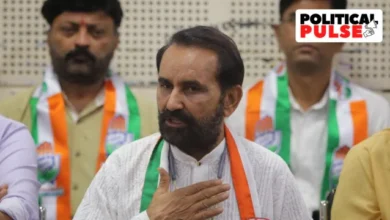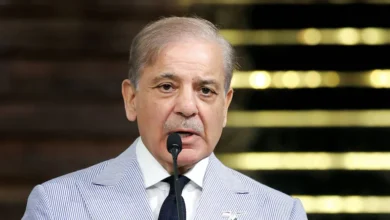Rahul Gandhi meets New Zealand Prime Minister Christopher Luxon during his visit to India.
Rahul Gandhi met New Zealand Prime Minister Christopher Luxon in Delhi to discuss strengthening bilateral relations. This meeting followed PM Narendra Modi’s discussions with Luxon, where both nations agreed to enhance defense ties and collaborate in education, sports, agriculture, and climate change.

Rahul Gandhi Attends Meeting with New Zealand PM Christopher Luxon to Cement Bilateral Ties
In a major diplomatic breakthrough, India’s opposition Congress party leader Rahul Gandhi met New Zealand Prime Minister Christopher Luxon in New Delhi to explore means of further enhancing the bilateral relationship between the two nations. The meeting, which took place on [insert date], was an important milestone in building international relations, as both leaders discussed ways of enhancing cooperation on a variety of issues such as defense, education, sports, agriculture, and climate change.

Building India-New Zealand Relations
The encounter between Rahul Gandhi and Christopher Luxon was just days after New Zealand Prime Minister Luxon had met with Indian Prime Minister Narendra Modi in an attempt to increase bilateral cooperation. Modi and Luxon, in their talks, put accentuation on tightening defense cooperation, with both countries agreeing on deepening cooperation in matters of defense and security. The two heads of state further concurred that there was need to develop cooperation in areas of education, sport, agriculture, and climate change, which were essential to both countries’ economic growth and development.
For Rahul Gandhi, the encounter with Luxon was a chance to follow up on these discussions from a wider diplomatic lens. Gandhi, long an advocate for enhancing India’s global relations, recognized the strategic need to form alliances with nations such as New Zealand. Gandhi and Luxon concurred on forging greater bilateral trade and promoting the exchange of ideas, technology, and innovation in major sectors.
Key Areas of Collaboration
The talks centred on some of the critical areas where the two countries can collaborate for each other’s interest:
1. Defense Cooperation: India and New Zealand both have shown keenness to bolster defense cooperation so that there could be more security and stability in the Indo-Pacific region. Shared interests in deterring emerging challenges have prompted the two countries to look into joint defense approaches, combined military maneuvers, and learning from each other in defense technology.
2. Education and Research: Education is a key area in global diplomacy, and both leaders underscored the importance of enhancing academic and research ties. India’s increasing number of skilled students and professionals offer rich opportunities for New Zealand’s education sector to interact with India’s vibrant intellectual and academic environment.
3. Sports: India and New Zealand are both sports-loving countries, and this encounter focused on the possibility of increased collaboration in the sphere of sports exchanges, training, and infrastructure. Both countries look to take advantage of each other’s strengths in order to strengthen their sporting culture, especially in cricket, rugby, and other major disciplines.
4. Agriculture: Since agriculture is a major sector in both economies, the two nations talked about collaborations to enhance agricultural practices, exchange research on crop farming, water management, and sustainable agricultural practices.
5. Climate Change: Climate change continues to be a significant global issue, and India and New Zealand share a common goal of fighting against environmental degradation. The two countries committed to collaborating with each other to support green technologies, renewable energy, and sustainable development practices.
A Stronger Future for Bilateral Relations
The summit between Rahul Gandhi and Christopher Luxon took place when global issues like the climate crisis and geopolitical tensions are at the center of worldwide diplomacy. India and New Zealand have similar interests when it comes to advancing peace, stability, and sustainable development, so their alliance is a necessary partnership for both countries.
Gandhi, during his encounter with Luxon, again reaffirmed that he was for deepening cooperation between India and New Zealand. He underlined that the creation of stronger diplomatic, economic, and cultural linkages would be beneficial not only for the two nations but would also positively enhance regional and global security.
Luxon, in turn, welcomed India’s dynamic democracy and its increasing presence on the international stage. He reiterated New Zealand’s determination to develop a strong relationship with India, especially in terms of trade, defense, and climate action.

A Broader Diplomatic Context
The meeting between Gandhi and Luxon also serves as a continuation of India’s broader foreign policy agenda, which has been focused on strengthening ties with like-minded nations and enhancing its strategic role in the Indo-Pacific region. India’s diplomatic approach under Prime Minister Modi has seen significant growth in relations with countries such as the United States, Australia, Japan, and several European nations. New Zealand, with its robust democratic credentials, shared values, and left-leaning policies, complements India’s vision of forging partnerships with countries that have common democratic ideals.
Conclusion
The encounter between Rahul Gandhi and New Zealand Prime Minister Christopher Luxon heralds a bright future for India-New Zealand relations. Both leaders underscored the need for cooperation in defense, education, agriculture, sports, and the issue of climate change, sectors that are critical to the prosperity of both countries in the future. Through these talks, the foundation has been established for an enhanced and more purposeful bilateral relationship that will become even stronger in the years to come. The ongoing interaction between New Zealand and India is sure to bear fruitful fruit, not just in the sphere of diplomatic relations but also in acquainting each other with deeper perceptions of one another’s cultures, values, and cooperative goals for world development and peace.






